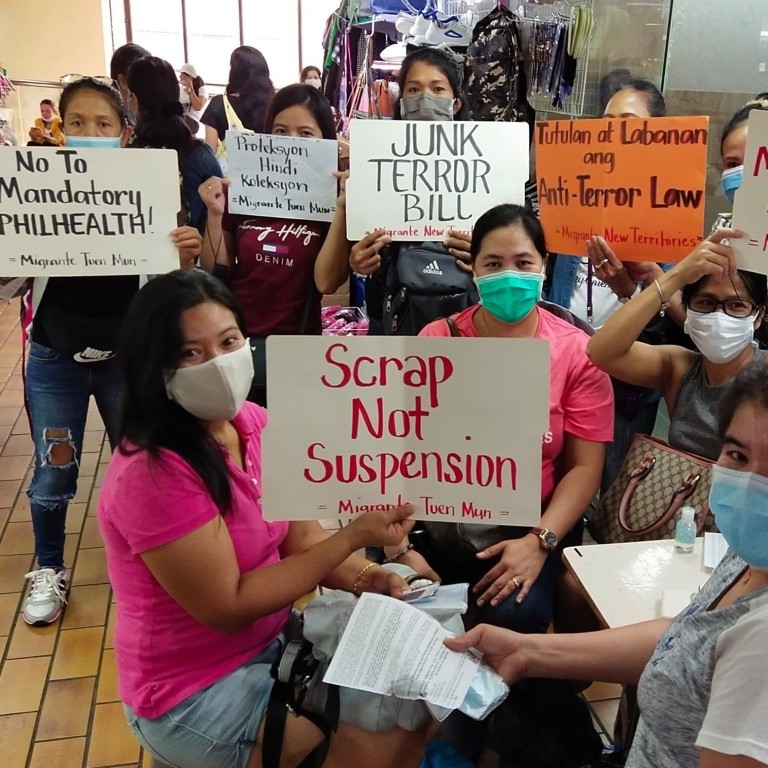
Why are overseas Filipinos worried about Duterte’s anti-terror law?
- Migrant leaders fear a vague definition of terrorism could be used to stifle criticism and curtail freedom of speech
- Manila’s envoy to Hong Kong says there is nothing to worry about
Union leaders say this case has had a chilling effect and that many now fear their freedom of expression and other rights may be further curtailed if the Philippine government enacts its anti-terrorism bill.
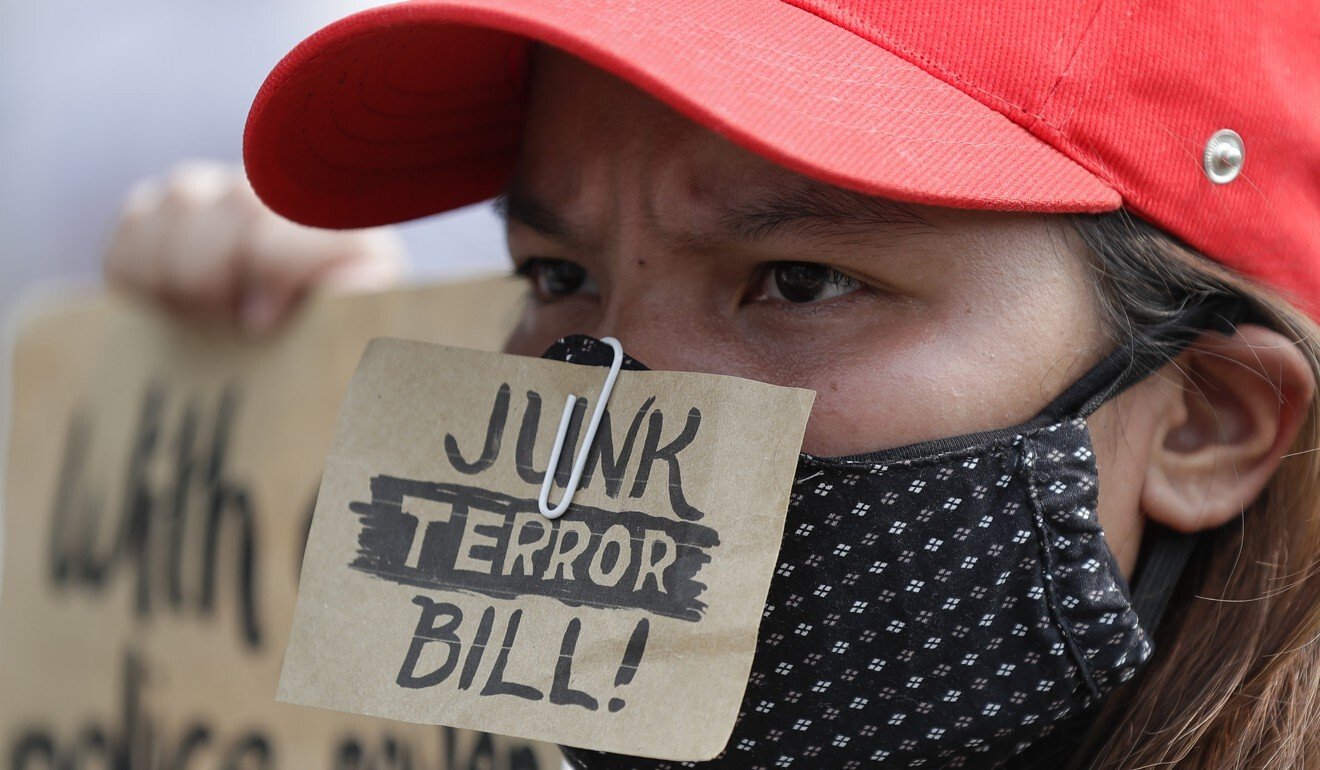
“We condemn this law in the strongest terms. Countless activists have been harassed, sent to prison and killed without due process. This law legalises all of that,” says Julia Mariano, a spokeswoman for Migrante International in Taiwan.
The House of Representatives passed the Anti-Terrorism Act on June 3, after it was approved by the Senate three months earlier. On Tuesday, the president’s office received the document.
Overseas migrant leaders, much like those who oppose the law in the Philippines, are concerned that the new bill defines terrorism too broadly. Under the bill, a special council composed mainly of members appointed by the president would be in charge of ordering the detentions of anyone they deemed to be terrorists.
Could Duterte critics be target of Philippines new anti-terror law?
If it goes ahead, suspects could be detained without a warrant and remain in custody without being charged for more than three weeks.
Under current legal provisions, terrorism suspects must be brought before a judge in three days. Most rights groups argue that those taken into custody should appear before a judicial authority within 48 hours.
Mariano, a spokeswoman for the migrants’ group in Taiwan, says the bill’s definition of terrorism is too vague. “We know our government hasn’t taken criticisms well and it may dismiss them as terrorism or rebellion,” she says. “Citizens like me should not have to worry that our legitimate concerns will eventually cost our lives and safety.”
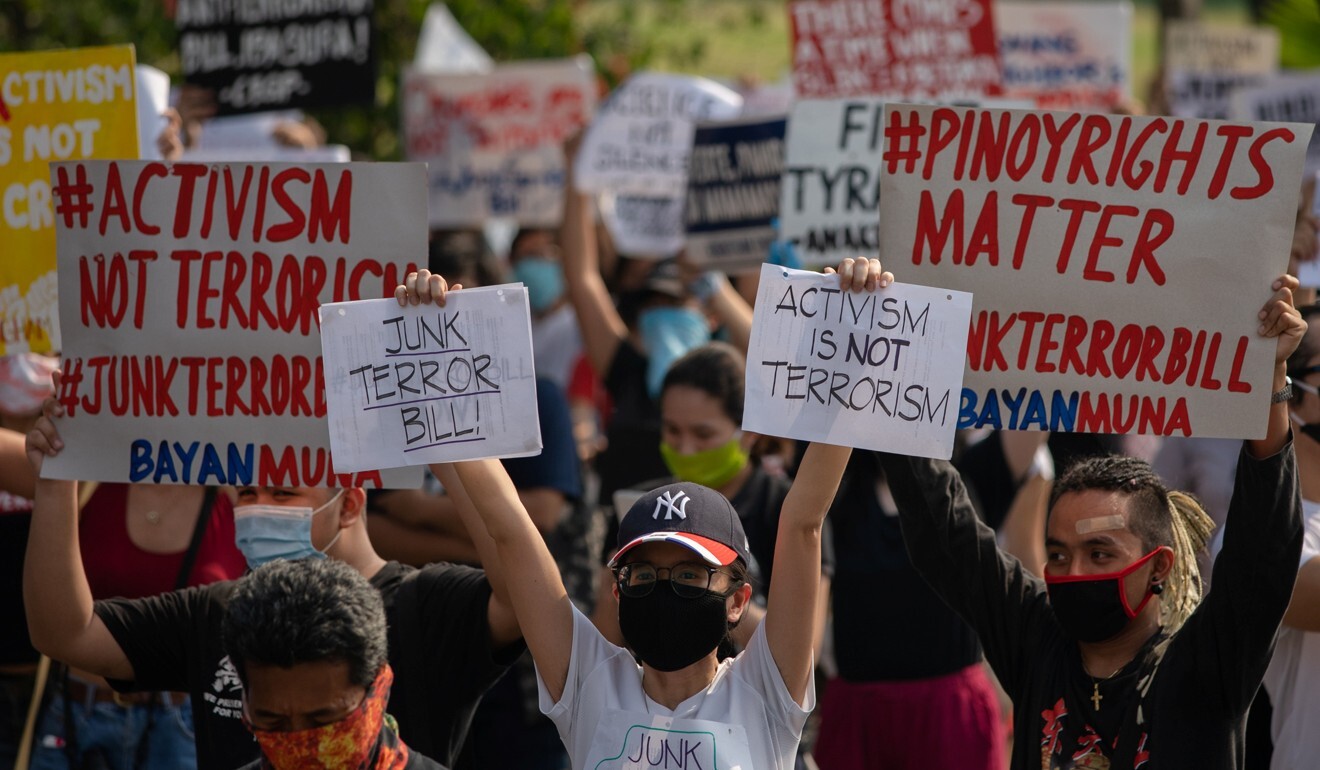
‘VILIFICATION OF DISSENT’?
In 2017, pro-Islamic State militants launched a takeover of the southern city of Marawi, which went on for five months.
The Philippines has also been fighting Asia’s longest-running insurgency, which is led by the Communist Party of the Philippines and the paramilitary arm New People’s Army. Both are seen by Manila as terrorist organisations.
Rights groups and activists have previously been “red tagged”, a local term referring to when someone is identified as a communist militant, which critics say has been used to silence dissent.
Who is behind surge in fake Facebook accounts in the Philippines?
Eman Villanueva, a domestic worker and chairman of migrants group Bayan Hong Kong and Macau, says a group supportive of Duterte in Hong Kong previously distributed leaflets in the city to fellow migrant workers suggesting that he and other union leaders supported the New People’s Army.
“We asked them to stop or we would file a case against them. But they continued posting photos and videos of us when we were public speaking with captions saying we are terrorist supporters,” he says.
Villanueva says this is one of the reasons migrant activists like him are so concerned about the anti-terrorism law.
“The bill itself is dangerous because it has many provisions that are unconstitutional and that attack basic human rights and democratic freedoms,” he says. “Moreover, it will be implemented by a dangerous government.”
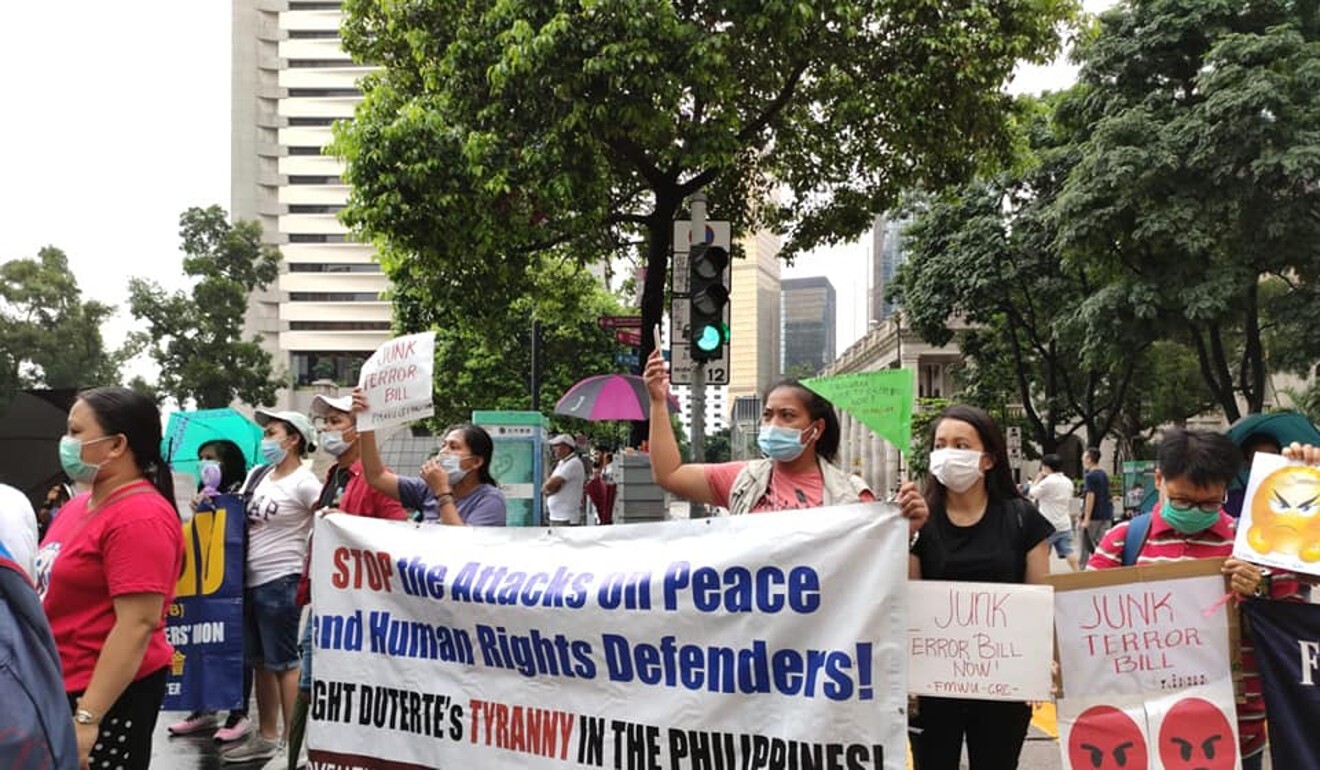
It also warned that the proposed anti-terror legislation could make things worse amid a backdrop of “the vilification of dissent”.
Under the new law, “there is much more discretion given to the authorities in their designation of individuals and organisations as terrorists, [and] there is really not the opportunity for individuals to present their case,” co-author of the report Ravina Shamdasani said.
The Philippine government said the report’s “faulty conclusions” were premised on alleged violations and that authorities had been focused on ensuring public safety and security. “That being said, the government will continue to respect its international legal obligations, including human rights,” the statement read.
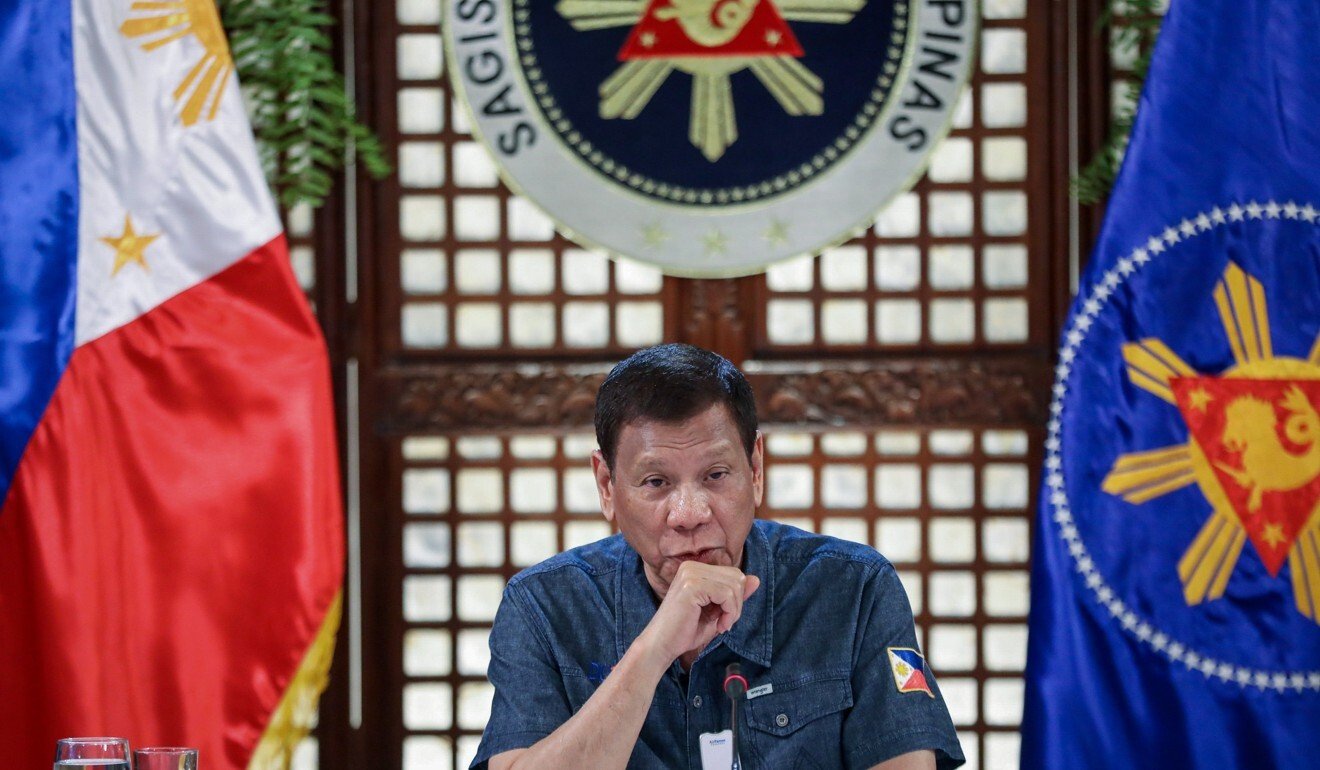
Defence Secretary Delfin Lorenzana also supported the proposal on May 31, saying there were civil liberty “safeguards” in place and that “the people need not fear”.
But other international rights groups have also raised concerns.
“The law will open the door to arbitrary arrests and long prison sentences for people or representatives of organisations that have displeased the president, ” says Phil Robertson, deputy Asia director at Human Rights Watch. “[It’s] a human rights disaster in the making.”
STILL SPEAKING OUT
Villanueva says that migrants groups will continue their advocacy work.
“We cannot be silenced by this kind of law, but I think it will have a chilling effect among the general public. Some migrant workers have already raised questions on whether they can share posts talking about corruption, for example. They ask if they will be arrested when returning home … people will fear for their lives or those of their families.”
For Villanueva, the recent incident in Taiwan has shown how determined the government is in intimidating its critics.
Shiella Estrada, chairwoman of the Progressive Labour Union of Domestic Workers in Hong Kong, has similar concerns.
“It seems that they want to stop all these organisations and trade unions that are fighting for rights and freedom of expression,” she says. “We absolutely need to protect our freedom of expression. If we don’t shout out loud and talk to the media, few things change.”
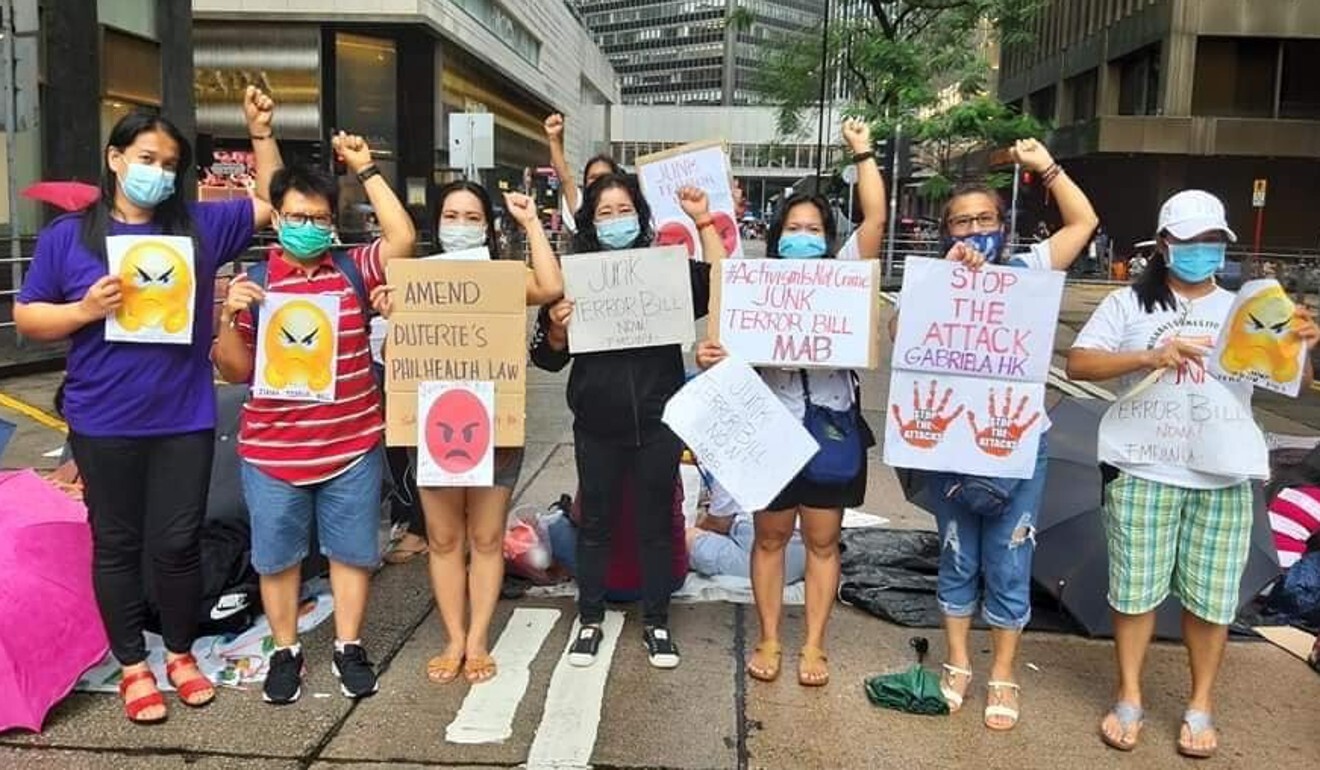
But Philippine Consul General Raly Tejada says that union leaders and migrant workers in cities like Hong Kong have “no reason” to be worried.
“The Philippine government will never put any Filipino in harm’s way,” he says. “Anything opposite is misguided and certainly will not sit well with the president who views Filipino overseas workers in high regard.”
Safety fears after Philippines names Oxfam a front for communist terror
“We have calamity assistance, bereavement assistance, medical assistance, and relief assistance,” he says, adding that other “unforeseen cases” may also be covered.
“Any qualified overseas worker stands to receive US$200 or 10,000 pesos in financial assistance from the government. It may be small compared to assistance programmes by other countries, but it cannot be said that the government stood idly by while Filipino overseas workers were losing their jobs or getting infected by Covid-19,” Tejada says. ■

